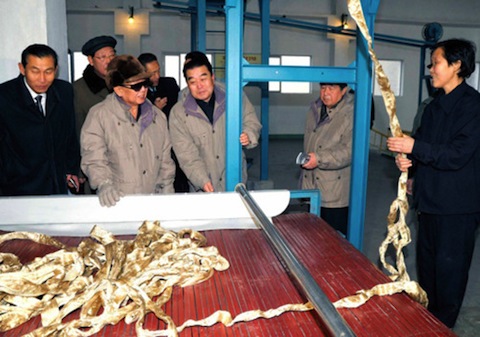
One of the small upsides of traveling is that it’s given me time to catch up on the to-read queue—not much else to do in a small Oregon town after sundown, except devour information and good beer in equal measure. The first book to fall was Barbara Demick’s Nothing to Envy, which is both brilliant and soul-crushingly sad. I exaggerate nothing when I say that one image in particular will always haunt me: That of a North Korean schoolteacher watching her favorite pupil slowly succumb to malnutrition during the 1990s famine, and realizing that nothing can be done to help the poor five-year-old.
Among the many things the book taught me about daily life in North Korea is the practical reason for much of the nation’s notoriously drab palette. As it turns out, the majority of the Hermit Kingdom’s clothing is made from Vinalon, a synthetic fiber made from coal and limestone, which was invented by a Korean in 1939. Because of its origins, Vinalon is considered politically correct by the Kim regime, and is thus the chief component in most North Korean uniforms. (The country’s main Vinalon factory can be glimpsed here.) But as Demick notes, the material is not without its shortcomings:
New clothes were dispensed by your work unit or school, often on Kim Il-sung’s birthday, reinforcing his image as the source of all good things. Everything was pretty much standard issue…The favored fabric was Vinalon, which didn’t hold dye very well, so there was a limited palette drab indigo for factory workers uniforms, black or gray for office workers. Red was reserved for the scarves that children wore around their necks until the age of thirteen as part of their obligatory membership in the Young Pioneers.
I have to wonder about the long-term psychological effects of existing in a society where colorful clothing is basically a technological impossibility. It must sap the ability to feel joy in some way, much as the long, bleak winters of Scandinavia are known to cause depression (as well as some pretty great music). And a nation without joy and its attendant mental energy is that much easier to deceive and subjugate.
Full Vinalon backstory here. Unmentioned in that bit, though, is the speculation that Vinalon production has been used as a front for the manufacture of weapons of mass destruction.


scottstev // May 25, 2011 at 11:04 am
I always felt that the most terrifying passages in 1984 were those that described the shabbiness of everyday life in Oceania. All those grubby tins of gin, and the soot.
I was just thinking today watching coverage of the terrible tornadoes in MO, that a sudden disaster can bring out the best in humanity, but that a slow-developing oppression can thoroughly dehumanize almost anyone, as reports of inter-family cannibalism in Ukraine famine show.
Wormholes | Microkhan by Brendan I. Koerner // May 27, 2011 at 3:39 pm
[…] growing and evolving more than we realize. When that growth is stunted, whether by prison or, say, life in a totalitarian nightmare, seeing how others have changed with the times must be disorienting, […]
That Revelatory Moment | Microkhan by Brendan I. Koerner // Jun 8, 2011 at 12:48 pm
[…] up a great passage from Barbara Demick’s Nothing to Envy, which I previously mentioned here. It also touches upon the ways in which we define our lives through the technological tools we […]
Lights Out: Another Dim Idea | Right Wing Nation // Jan 31, 2014 at 12:45 pm
[…] But the real reason I find this movement troubling, and the reason I cannot simply dismiss it (as many others appear to have) is that Big Government really has no business banning any product, much less the common light bulb. Once the precedent has been set, and a seemingly commonplace ban is put into effect without so much as a whimper from the masses, the slippery slope is set underfoot. Next we will be seeing bans on certain appliances, on vehicles, on travel destinations and distances. Anything can be targeted in the name of conserving energy. Once it becomes the duty of the nanny state to decide what can and cannot be purchased, the free market will falter and capitalism will be eroded. When free citizens are stripped of their independence and ability to make rational decisions, choice is gradually eliminated. On and on it will go until one day our liberty is eradicated and we will find ourselves wearing drab ‘Vinalon’ uniforms 12. […]